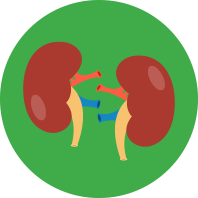Normal Blood Calcium Levels in Osteoporosis – Understanding Your Test Results

Do you know what your blood calcium levels should be?
After all, if your levels are too high or too low, it can have big implications for your health.
There’s a common misconception with blood calcium levels too. Many people think blood calcium levels are directly related to how much calcium you consume. But that’s not the case!
We’ll go over exactly what your blood calcium levels mean, what affects them, and how they’re related to your bone health in just a moment, but first let’s see how you measure blood calcium levels in the first place.
The Total Calcium Blood Test
A total calcium blood test measures how much calcium is in your blood.
Calcium is one of the most vital minerals in your entire body. You need it to maintain healthy bones, to clot your blood, and to keep your nerves, heart, and muscles in full working order. So your calcium blood levels need to be within a certain range for smooth operation.
If You’re Worried About Losing Calcium
While a total calcium blood test is useful to discover how much calcium is in your blood, it doesn’t show how much calcium you may be losing. So if you have osteoporosis or are concerned about your bone health, you’ll find a 24-hour urine calcium test useful. It’s normal to lose some calcium in your urine, but anything over 200 mg for women and 250 mg for men over 24 hours is considered high. This is called hypercalciuria.
Consuming too much calcium or vitamin D may cause elevated urinary calcium loss– but it’s relatively rare (you’d have to be consuming a lot!) More commonly, high urinary calcium loss is caused by factors which increase serum calcium like an overactive parathyroid gland (we cover this in more detail a little further down the page.) Some drugs can also increase urinary calcium loss.
When Do You Need a Total Calcium Blood Test?
Taking a total calcium blood test is common practice. Your doctor may even do a total calcium blood test during a regular health exam. The test screens for malnutrition, or for diseases like; bone disease, kidney disease, parathyroid disease, and various cancers.
The test itself involves your doctor taking a blood sample from your arm.
IS THE TOTAL CALCIUM BLOOD TEST THE ONLY CALCIUM BLOOD TEST?
No. In fact, there are two calcium blood tests. You can see what they are, and when they may be used in the table below.
But the total calcium blood test is the most common test and the one we’ll be discussing in depth on this page. So read on below to discover everything you need to know about a total calcium blood test!
Total Calcium Blood Test
(aka Calcium Serum Level test)
What is it?
A blood test to measure the total amount of calcium in your blood (both “free calcium” and “bound calcium”)
Why Might You Need This Test?
To screen for malnutrition, or diseases like; bone disease, kidney disease, parathyroid disease, and various cancers
Ionized Calcium Blood Test
What is it?
A more specific test to measure the level of ionized or “free calcium” in your blood only. “Free calcium” means the calcium that isn’t bound to a protein or an anion (a negatively charged ion)
Why Might You Need This Test?
If you have factors that increase or decrease your total calcium levels. These may include abnormal blood levels of albumin or immunoglobulins proteins.
Total Calcium Blood Test Results – What Do They Mean?
It’s important to remember a total calcium blood test won’t show how much calcium is in your bones. Truth is, your bones contain almost all of your body’s calcium. A very small amount (about 1%) is in your blood, and your parathyroid glands regulate this. When blood calcium levels are low, the parathyroid gland releases parathyroid hormones (PTH). PTH stimulate cells in the bones to break bone down and release calcium into the blood.
A total calcium blood test will show how many milligrams of calcium are in a deciliter of your blood. Your doctor will then compare this score with the reference range expected of a healthy person. If your score is outside the expected reference range, it could indicate an underlying health issue.

Normal Calcium Levels
The reference range may vary slightly between different labs, but a normal calcium blood level is around 8.6-10.2 milligrams (mg) of calcium per deciliter of blood (dL). If your test results fall within this range, your calcium metabolism is on track, and the levels in your blood are being regulated correctly.
Please note: You should always use the reference range provided by the lab that evaluated your calcium blood level.
Normal Calcium Levels and Osteoporosis
The results of a total calcium blood test are usually normal for people with osteoporosis. That means it’s possible to have normal blood calcium levels and still be losing bone. However, other bone diseases may show elevated results. These bone diseases include:
Remember, a total calcium blood test isn’t used to diagnose disease. Your blood calcium levels don’t indicate how much calcium is in your bones, or whether you’re losing calcium at an abnormal rate. But a total calcium blood test can give an indication of underlying problems– some of which can lead to osteoporosis if left unchecked.
To discover if you’re losing calcium at a high enough rate to cause bone loss you’ll need the 24-hour urine calcium test. You can refer back to the highlighted “If You’re Worried About Losing Calcium” box towards the top of the page for more information.
Low Calcium Levels
If your total blood calcium test score is below 8.6 mg/dL, your blood calcium levels are too low. This is called hypocalcemia.
Symptoms of Low Calcium Levels (Hypocalcemia)
If you recall, we mentioned earlier that you need calcium to maintain the normal function of your muscles and nerves. So the most common symptoms of hypocalcemia are neuromuscular issues like:
Potential Causes of Low Calcium Levels (Hypocalcemia)
There are several possible reasons why you might have low calcium blood levels. The most common causes are:
But these aren’t the only potential causes of low calcium levels. Refer to the table below for a more comprehensive list.
High Calcium Levels
If your total blood calcium score is above 10.2 mg/dL, your blood calcium levels are too high. This is called hypercalcemia.
Now, there are several possible causes of hypercalcemia, and some can lead to osteoporosis if they’re left unchecked! (We’ll cover the causes of high calcium blood levels in more detail below).
Symptoms of High Calcium Levels (Hypercalcemia)
What Causes High Calcium Blood Levels?
A lot of people think their calcium intake, from diet or supplements, affects their blood calcium levels. But this isn’t the case. You can see the real factors that affect high calcium blood levels outlined below:

Hyperparathyroidism
Hyperparathyroidism occurs when your parathyroid glands are overactive, and release too much parathyroid hormone. This abundance of parathyroid hormone causes your bones to release too much calcium into your bloodstream. As you know you need calcium to stay in your bones to keep them strong and healthy, so hyperparathyroidism can lead to osteoporosis!
There are two forms of hyperparathyroidism:
PRIMARY HYPERPARATHYROIDISM
Primary hyperparathyroidism is the most common cause of high calcium blood levels. It’s thought to cause 90% of high calcium blood level cases.
Primary hyperparathyroidism can occur because of one of the following issues with one or more of your four parathyroid glands:
SECONDARY HYPERPARATHYROIDISM
Secondary hyperparathyroidism isn’t a disease of the parathyroid glands. It’s caused by insufficient calcium or vitamin D intake, or your body’s response to a condition which is lowering your calcium blood levels. This response may balance your calcium blood levels initially, but will lead to abnormally high levels over time.

Dysfunctional Kidneys/Kidney Disease
When your kidneys are healthy, they turn vitamin D into its active, hormonal form of 1,25-D. This is the only form of vitamin D which helps you absorb calcium from your intestines. But if your kidneys aren’t functioning properly, your ability to turn vitamin D into its active form is impaired. So your ability to absorb calcium from your bloodstream is impaired too.

Cancer
Hypercalcemia affects 10-30% of cancer patients. It occurs because cancerous tumors produce parathyroid hormone-related proteins. These proteins activate parathyroid hormone receptors in your tissue, which results in an increase in the production and activity of your bone-resorbing osteoclast cells. This leads to calcium being released from your bones and sent into your bloodstream.
Hypercalcemia is common in the advanced stages of the following cancers:

Certain Medications
Certain medications commonly used to treat hypertension (high blood pressure) can cause high calcium blood levels by increasing the reabsorption of calcium in the kidneys. This prevents the kidneys from removing excess calcium via urine.
You can see examples of this medication by clicking here.

High bone turnover
Very high bone turnover (bone loss) can result in high blood levels of calcium. Now, this bone loss can result from many causes. Virtually anything that causes chronic inflammation will activate osteoclasts to break down and remove bone.
You can control the amount of inflammation in your body by eating an anti-inflammatory diet. To get you started, these are three of the most powerful anti-inflammatories:
Omega 3 fatty acids: Are found in oily fish like salmon and sardines. Omega 3 fatty acids tune down your inflammatory signaling and regulate your bone-building osteoblast cells and bone-resorbing osteoclast cells.
Astaxanthin: Has been shown to significantly lower levels of C-reactive protein, which is a biomarker for systemic inflammation. It’s considered one of the most powerful natural carotenoid antioxidants and is 65x more potent than vitamin C, 54x more than β-carotene, and 14x more than vitamin E! It’s also what provides the red color in salmon, seafood, and even flamingos. Don’t worry though – it won’t happen to you!
Turmeric curcumin: A curcuminoid in the turmeric plant. Many studies have shown turmeric curcumin is a powerful anti-inflammatory.

Other rare causes include:
The Takeaway
For all the great benefits of cruciferous vegetables, there is a slight concern that they could be related to thyroid issues like hypothyroidism. Cruciferous vegetables contain goitrogens that affect the way your thyroid gland uses iodine.
However, you’d have to be eating an enormous quantity of broccoli, or any other cruciferous vegetable, for it to cause a thyroid issue.
If you already have a thyroid issue, it’s best to consume your cruciferous vegetables cooked and to stick to a maximum of one or two servings a day. Cooking reduces the potency of the goitrogens.
Other Calcium-Rich Foods
A total calcium blood test measures the total amount of calcium in your blood. If your levels are too low or too high, it’s very rarely related to the amount of calcium you consume. More often than not, abnormal blood calcium levels signify the presence of an underlying health condition like the ones we’ve discussed on this page. Some of which can lead to osteoporosis!
If you have osteoporosis or are concerned about bone loss, you may find a 24-hour urine calcium test useful. It will show how much calcium you’re losing in your urine.
For more information on a total calcium blood test or a 24-hour urine calcium test, discuss the next steps with your doctor.
If you want to learn more about calcium, check out our other calcium-related pages: